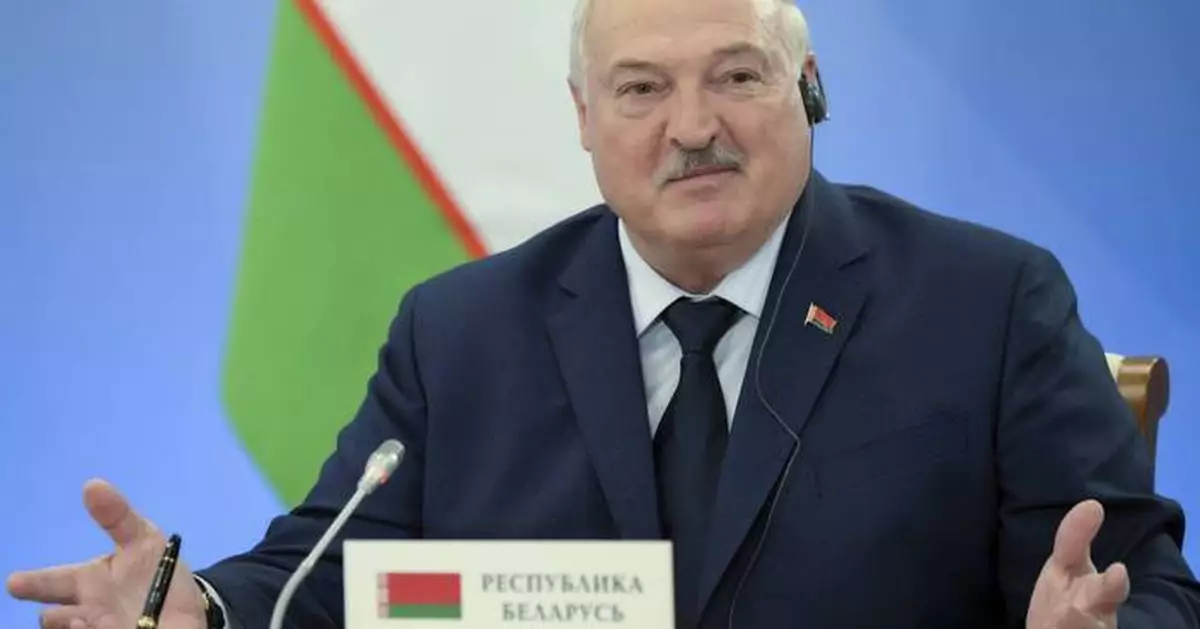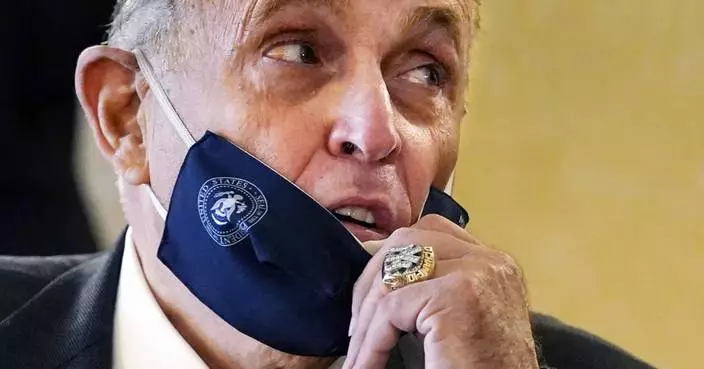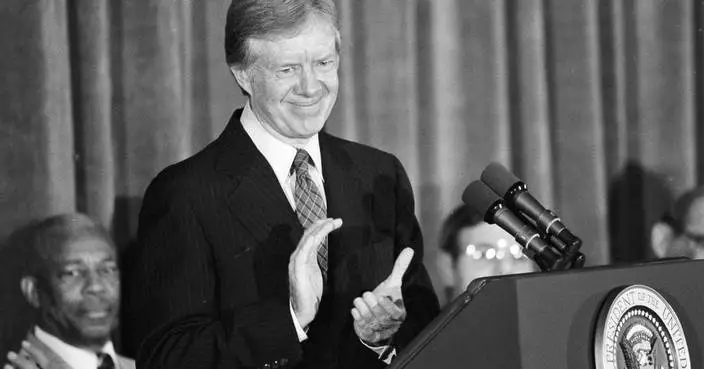TALLINN, Estonia (AP) — A Catholic priest in Belarus on Monday was convicted on charges of high treason for criticizing the government and handed an 11-year sentence, in the first case of politically-driven charges against Catholic clergy since Belarus became independent in the 1991 collapse of the Soviet Union.
The conviction and sentencing of Rev. Henrykh Akalatovich comes as Belarusian authorities have intensified their sweeping crackdown on dissent ahead of the Jan. 26 presidential election that is all but certain to hand authoritarian President Alexander Lukashenko a seventh term in office.
The Viasna Human Rights Center said Akalatovich, 64, rejected the treason charges. The group has listed him among 1,265 political prisoners in the country.
“For the first time since the fall of the Communist regime, a Catholic priest in Belarus was convicted on criminal charges that are leveled against political prisoners,” said Viasna's representative Pavel Sapelka. “The harsh sentence is intended to intimidate and silence hundreds of other priests ahead of January's presidential election.”
Akalatovich, who has been in custody since November 2023, was diagnosed with cancer and underwent surgery just before his arrest. The priest from the town of Valozhyn in western Belarus, who was critical of the government in his sermons, has been held incommunicado, with prison officials turning down warm clothing and food sent to him.
Arkatovich is among dozens of clergy — Catholic, Orthodox and Protestant — who have been jailed, silenced or forced into exile for protesting the 2020 election that gave Lukashenko a sixth term. The disputed vote that the opposition and the West said was marred with fraud triggered mass protests, to which the authorities responded with a sweeping crackdown that saw more than 65,000 arrested and thousands beaten by police.
Catholic and Protestant clergy who supported the protests and sheltered demonstrators at their churches were particularly targeted by repressions. Belarusian authorities openly seek to bring the clergy into line, repeatedly summoning them for “preventive” political talks, checking websites and social media, and having security services monitor sermons.
While Orthodox Christians make up about 80% of the population, just under 14% are Catholic and 2% are Protestants.
Lukashenko, who has ruled Belarus for nearly 30 years and describes himself as an “Orthodox atheist,” lashed out at dissident clergy during the 2020 protests, urging them to “do their jobs,” and not fuel unrest.
Lukashenko is one of Russian President Vladimir Putin’s closest allies, allowing Russia to use his country’s territory to send troops into Ukraine in February 2022 and to deploy some of its tactical nuclear weapons in Belarus.
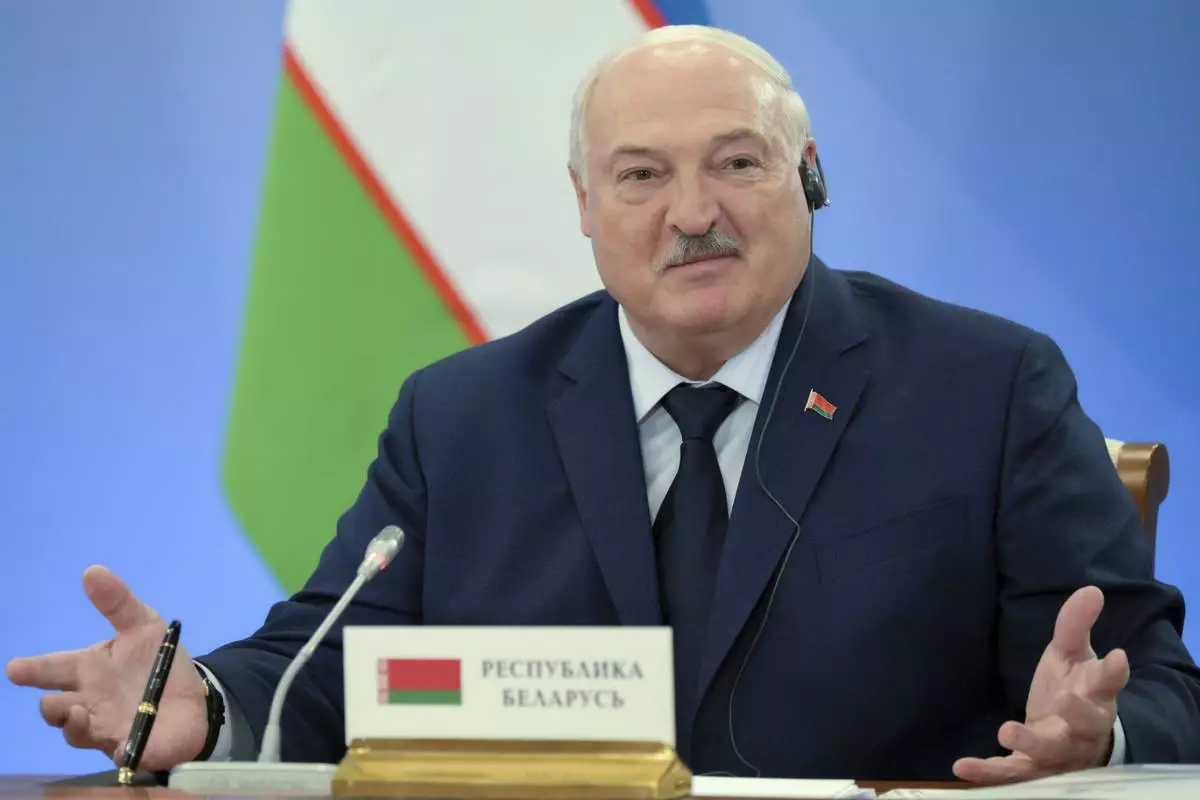
Belarusian President Alexander Lukashenko attends the Supreme Eurasian Economic Union meeting at the Igora resort in the Leningrad region, about 54 km (33,75 miles) north of St. Petersburg in Igora, Russia, Thursday, Dec. 26, 2024. (Alexei Danichev, Sputnik, Kremlin Pool Photo via AP)
SEOUL, South Korea (AP) — Impeached South Korean President Yoon Suk Yeol, in a letter to conservative supporters rallying outside his Seoul residence, vowed to “fight to the end” against “anti-state forces,” while his legal team claimed on Thursday that police officers attempting to detain him could face arrest by his presidential security service or even civilians.
Yoon’s latest statements of defiance came as the Corruption Investigation Office for High-Ranking Officials prepared to execute its detainment warrant against him, issued by a Seoul court on Tuesday and valid for one week. The warrant was in response to Yoon’s evasion of multiple requests to appear for questioning and blocking searches of his office, hindering an investigation into whether his short-lived power grab on Dec. 3 amounted to rebellion.
Oh Dong-woon, the anti-corruption agency’s chief prosecutor, has indicated that police forces might be deployed if Yoon’s security service resists the detention attempt, which could occur as early as Thursday. But it remains unclear whether Yoon can be compelled to submit to questioning.
Yoon’s legal team issued a statement on Thursday warning that any attempt by the anti-corruption agency to use police mobile units for his detention would exceed their legal authority. The lawyers further said that police officers could face arrest by either the “presidential security service or any citizens” if they try to detain him. They didn’t further elaborate on the claim.
South Korean law permits anyone to make arrests to stop an active crime, and critics accused Yoon of inciting his supporters to obstruct law enforcement’s attempts to detain him.
In a message to hundreds of supporters gathered outside his residence Wednesday evening, Yoon said he would continue to fight against anti-state forces “violating our sovereignty” and putting the nation in “danger.” He applauded his supporters for their efforts to protect the country’s “liberal democracy and constitutional order” and said he was watching their protests on live YouTube broadcasts, according to a photo of the message shared by Yoon’s lawyers.
The liberal opposition Democratic Party, which drove the legislative vote that impeached Yoon on Dec. 14 over the martial law imposition, accused the president of trying to mobilize his supporters to block his detention and called for law enforcement authorities to execute the warrant immediately.
A growing number of Yoon’s supporters were again gathering near his residence on Thursday morning amid a heavy police presence, waving small South Korean and American flags and holding signs opposing his impeachment. There were no immediate reports of clashes or major disturbances.
“The Corruption Investigation Office must detain him immediately, and the presidential security service must cooperate with the lawful execution of the detainment warrant,” said Park Chan-dae, the Democrats’ floor leader.
“They should be aware that obstructing the execution of the detainment warrant could result in punishment for interference with official duties and complicity in rebellion,” he said.
Yoon’s lawyers have argued that the court’s detainment warrant is “invalid,” claiming that the anti-corruption agency lacks legal authority to investigate rebellion charges. They also accuse the court of bypassing a law that says locations potentially linked to military secrets cannot be seized or searched without the consent of the person in charge.
Some experts believe the anti-corruption agency, which is leading a joint investigation with police and military authorities, would not risk clashing with Yoon’s security service, which has said it will provide security to Yoon in accordance with the law. The office may instead issue another summons for Yoon to appear for questioning if they are not able to execute the detainment warrant by Jan. 6.
If Yoon is detained, the anti-corruption agency will have 48 hours to investigate him and either request a warrant for his formal arrest or release him. Yoon’s defense minister, police chief and several top military commanders have already been arrested over their roles in the martial law enactment.
Yoon’s presidential powers were suspended following the National Assembly vote to impeach him on Dec. 14 over his imposition of martial law, which lasted only hours but has triggered weeks of political turmoil, halted high-level diplomacy and rattled financial markets. Yoon’s fate now lies with the Constitutional Court, which has begun deliberations on whether to uphold the impeachment and formally remove Yoon from office or reinstate him.
To formally end Yoon’s presidency, at least six justices on the nine-member Constitutional Court must vote in favor.
The National Assembly voted last week to also impeach Prime Minister Han Duck-soo, who had assumed the role of acting president after Yoon’s powers were suspended, over his reluctance to fill three Constitutional Court vacancies ahead of the court’s review of Yoon’s case.
In the face of growing pressure, the country’s new interim leader, Deputy Prime Minister Choi Sang-mok, appointed two new justices on Tuesday, which possibly increased the chances of the court upholding Yoon’s impeachment.
Cho Han-chang, one of the newly appointed court justices, said Thursday that he begins his job with a “heavy heart.” Jeong Gye-seon, the other new justice, expressed hope that the remaining vacancy would be filled.
Yoon’s imposition of martial law lasted only six hours but triggered huge political turmoil that also halted high-level diplomacy and shocked financial markets. Yoon and his military leadership have been accused of attempting to block the National Assembly from voting to end martial law by sending hundreds of heavily armed troops to encircle the building. Lawmakers who managed to get in voted unanimously 190-0 to lift martial law, hours after Yoon declared it on late-night television.
Yoon has also been accused of ordering defense counterintelligence officials to detain key politicians, including opposition leader Lee Jae-myung and National Assembly Speaker Woo Won Shik.
Yoon has defended the martial law decree as a necessary act of governance, portraying it as a temporary warning against the Democratic Party, which he has described as an “anti-state” force obstructing his agenda with its legislative majority.
Yoon has also claimed he had no intention to paralyze the functioning of the assembly, saying that the troops were sent to maintain order, and also denied planning to arrest politicians. But some arrested military commanders have contradicted Yoon’s claims.
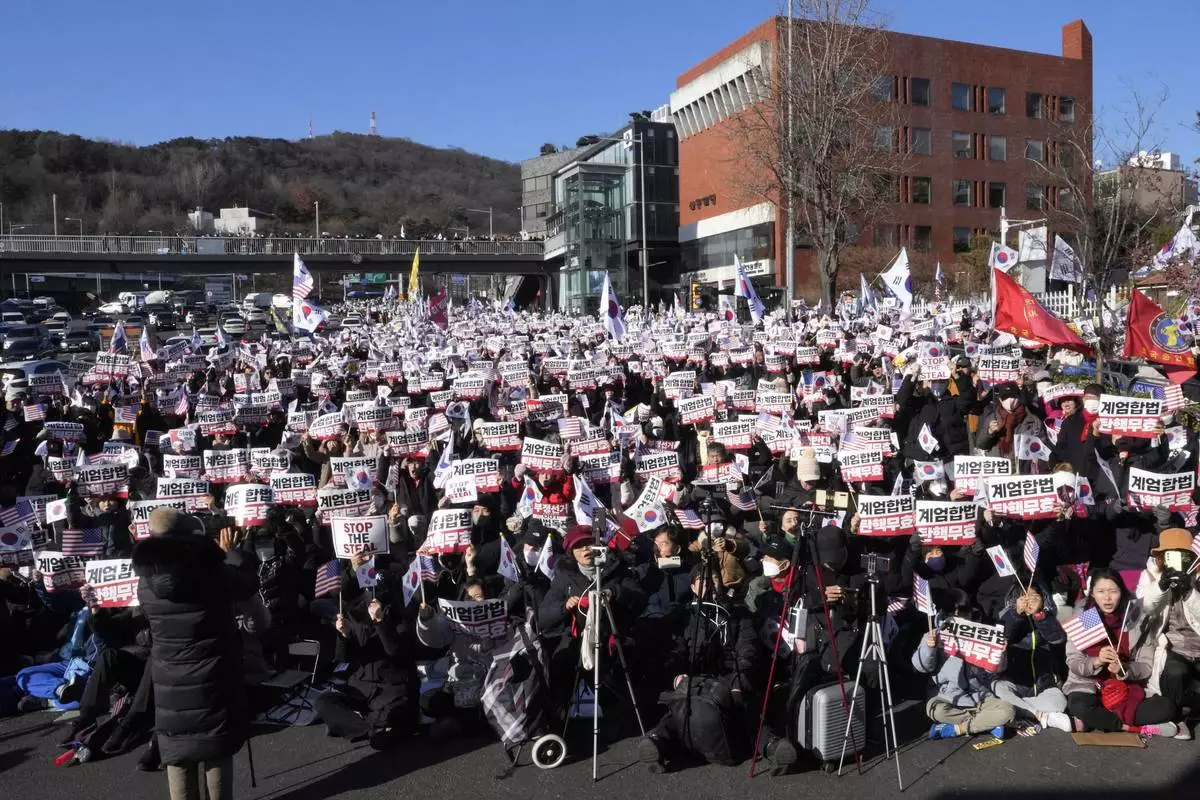
Supporters of impeached South Korean President Yoon Suk Yeol stage a rally to oppose a court having issued a warrant to detain Yoon, near the presidential residence in Seoul, South Korea, Thursday, Jan. 2, 2025. The signs read, "Oppose impeachment." (AP Photo/Ahn Young-joon)
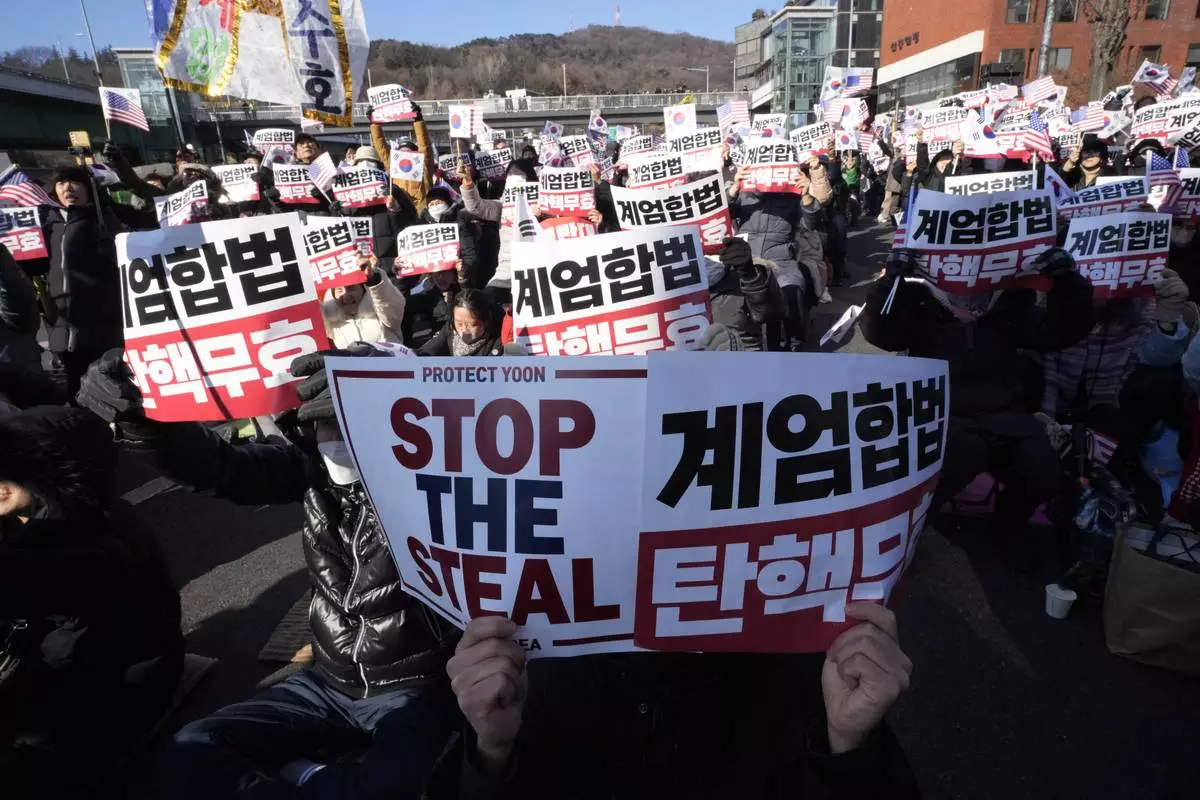
Supporters of impeached South Korean President Yoon Suk Yeol stage a rally to oppose a court having issued a warrant to detain Yoon, near the presidential residence in Seoul, South Korea, Thursday, Jan. 2, 2025. The signs read, "Oppose impeachment." (AP Photo/Ahn Young-joon)
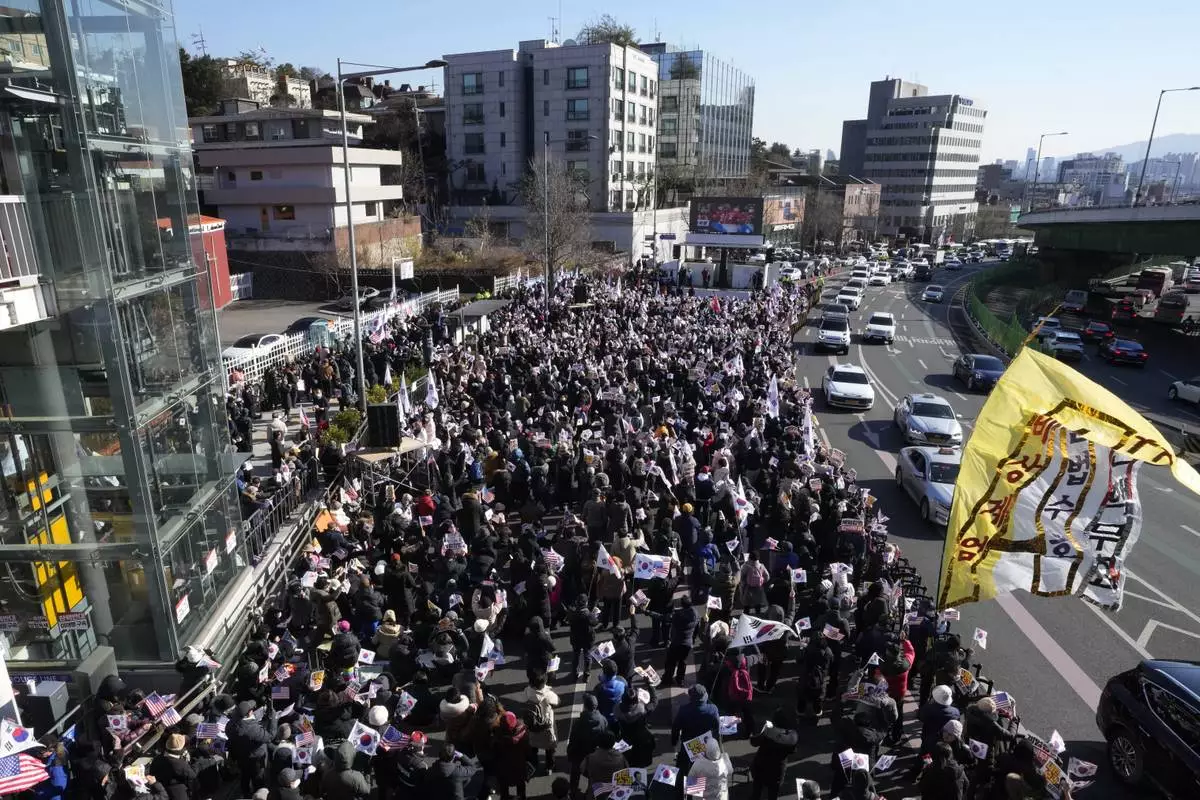
Supporters of impeached South Korean President Yoon Suk Yeol stage a rally to oppose a court having issued a warrant to detain Yoon, near the presidential residence in Seoul, South Korea, Thursday, Jan. 2, 2025. (AP Photo/Ahn Young-joon)
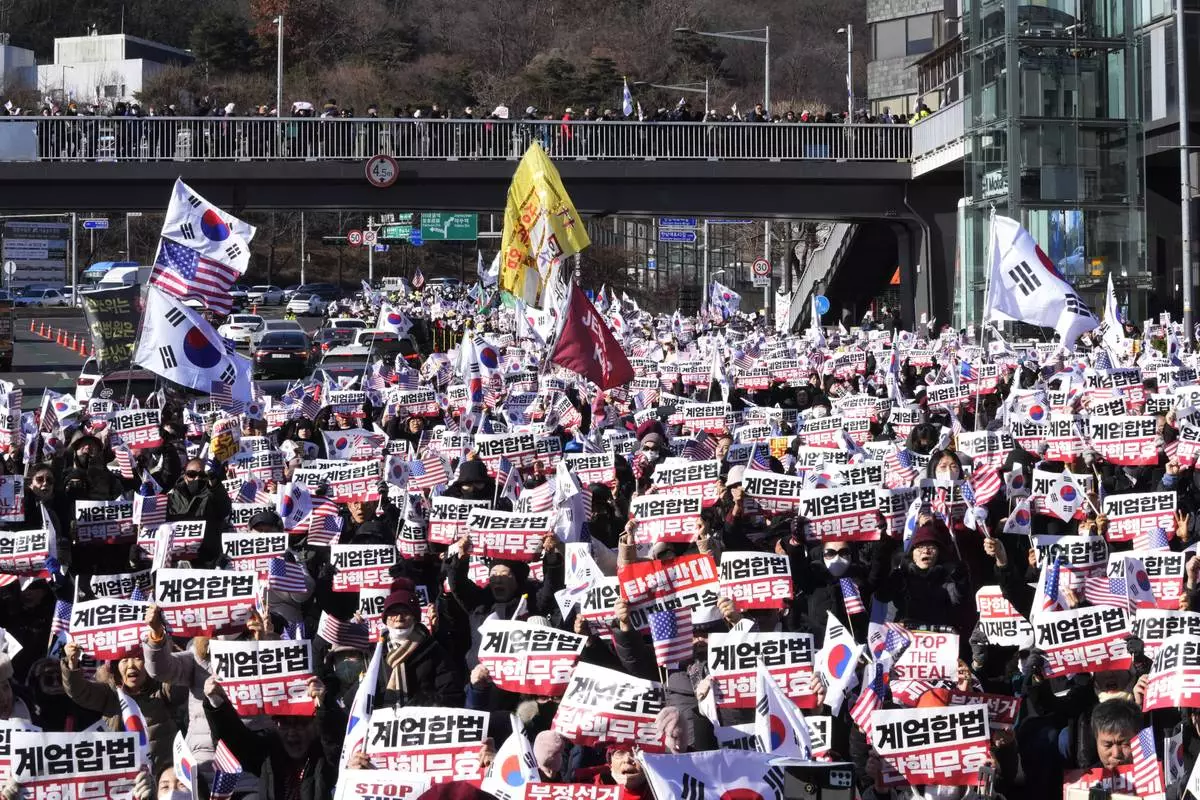
Supporters of impeached South Korean President Yoon Suk Yeol stage a rally to oppose a court having issued a warrant to detain Yoon, near the presidential residence in Seoul, South Korea, Thursday, Jan. 2, 2025. The signs read, "Oppose impeachment." (AP Photo/Ahn Young-joon)
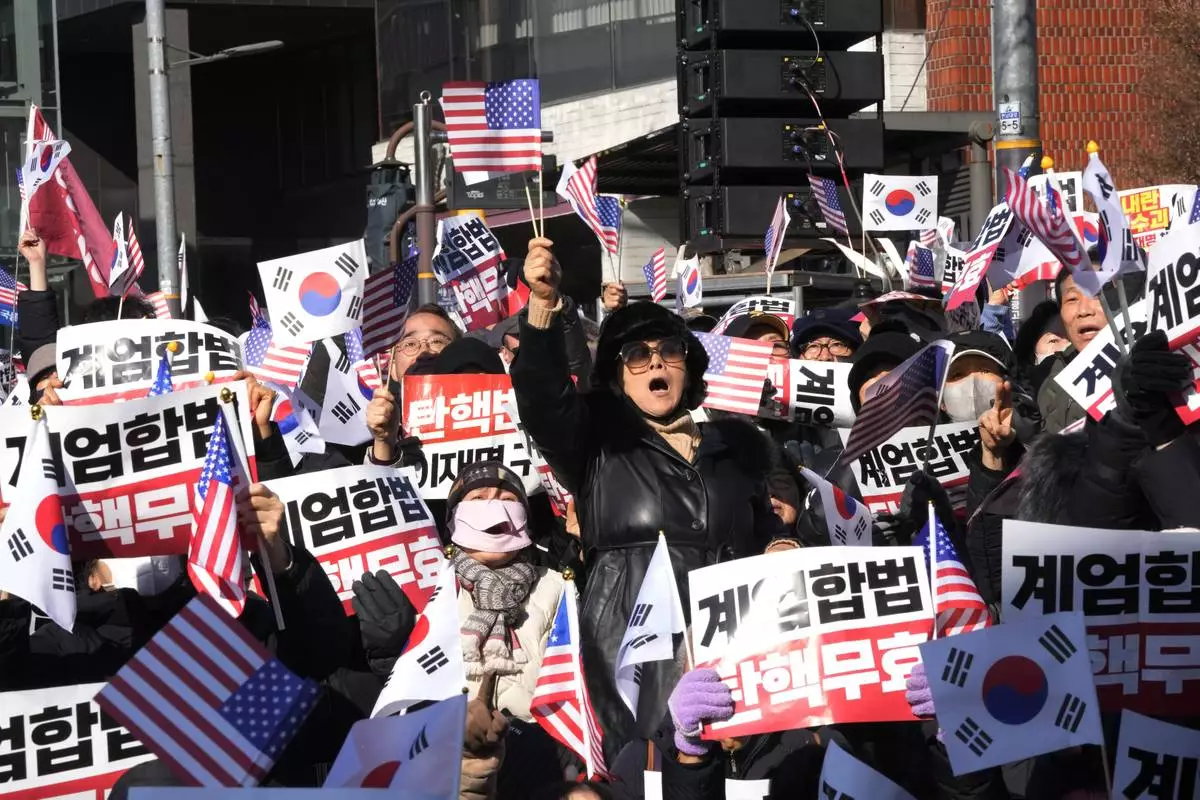
Supporters of impeached South Korean President Yoon Suk Yeol stage a rally to oppose a court having issued a warrant to detain Yoon, near the presidential residence in Seoul, South Korea, Thursday, Jan. 2, 2025. The signs read, "Oppose impeachment." (AP Photo/Ahn Young-joon)
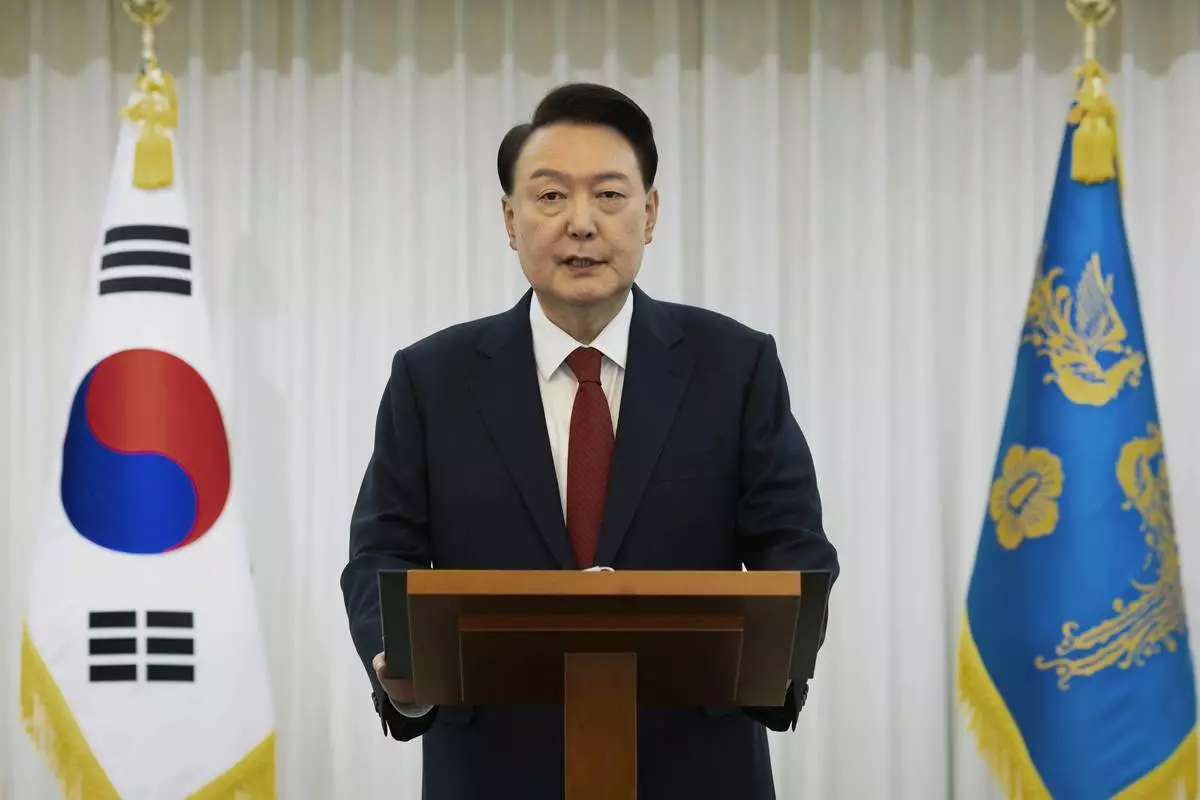
FILE - In this photo provided by the South Korean President Office, the country's President Yoon Suk Yeol speaks at the presidential residence in Seoul, South Korea, Dec. 14, 2024. (South Korean Presidential Office via AP, File)



